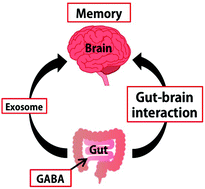γ-Aminobutyric acid (GABA) activates neuronal cells by inducing the secretion of exosomes from intestinal cells
Abstract
The oral administration of γ-aminobutyric acid (GABA) has been shown to affect brain functions. However, the molecular mechanisms underlying GABA-induced gut–brain interactions have not yet been fully elucidated. As the blood–brain barrier is impermeable to GABA, we hypothesized that the gut–brain interaction might be stimulated by some secretory factors derived from the gut. Then we focused on exosomes as a secretory mediator. In the present study, we investigated whether exosomes derived from GABA-treated intestinal cells activate neuronal cells. Our results revealed that secretory factors derived from GABA-treated intestinal cells (Caco-2) activated neuronal cells (SH-SY5Y). Further investigation revealed that exosomes derived from GABA-treated Caco-2 cells were responsible for activating the SH-SY5Y cells. These results suggested that GABA-activated intestinal cells induce the secretion of exosomes that activate neuronal cells. MicroRNAs in the exosomes derived from GABA-treated intestinal cells may play a key role in the activation of neuronal cells.



 Please wait while we load your content...
Please wait while we load your content...